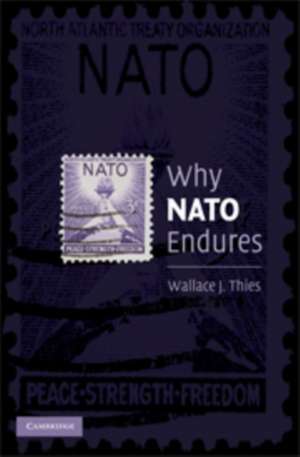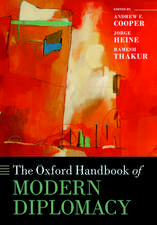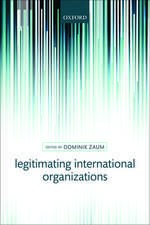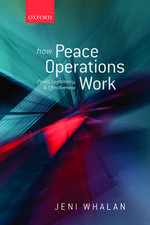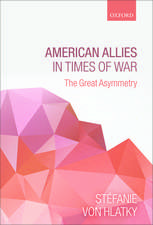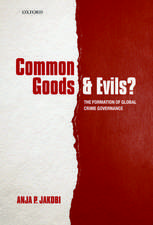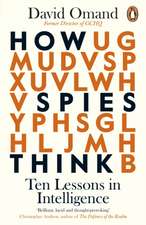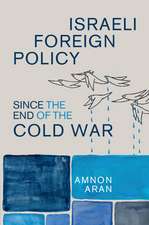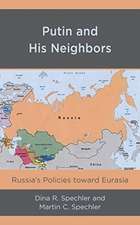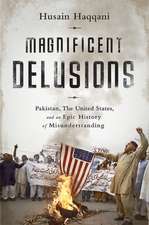Why NATO Endures
Autor Wallace J. Thiesen Limba Engleză Hardback – 28 iun 2009
| Toate formatele și edițiile | Preț | Express |
|---|---|---|
| Paperback (1) | 282.91 lei 6-8 săpt. | |
| Cambridge University Press – 21 iun 2009 | 282.91 lei 6-8 săpt. | |
| Hardback (1) | 558.08 lei 6-8 săpt. | |
| Cambridge University Press – 28 iun 2009 | 558.08 lei 6-8 săpt. |
Preț: 558.08 lei
Preț vechi: 627.05 lei
-11% Nou
Puncte Express: 837
Preț estimativ în valută:
106.82€ • 111.09$ • 89.51£
106.82€ • 111.09$ • 89.51£
Carte tipărită la comandă
Livrare economică 14-28 martie
Preluare comenzi: 021 569.72.76
Specificații
ISBN-13: 9780521767293
ISBN-10: 0521767296
Pagini: 334
Dimensiuni: 165 x 242 x 22 mm
Greutate: 0.61 kg
Editura: Cambridge University Press
Colecția Cambridge University Press
Locul publicării:New York, United States
ISBN-10: 0521767296
Pagini: 334
Dimensiuni: 165 x 242 x 22 mm
Greutate: 0.61 kg
Editura: Cambridge University Press
Colecția Cambridge University Press
Locul publicării:New York, United States
Cuprins
1. The curious relationship; 2. Rivalry and community in interstate alliances prior to the Second World War; 3. Creating a contentious alliance; 4. Why NATO is different; 5. NATO and the military balance; 6. NATO and the out-of-area issue; 7. Non-military issues; 8. Why NATO endures.
Recenzii
'For almost two decades, NATO's persistence has confounded continual predictions of its timely demise. Now, Wallace Thies tells us why. In this historically informed and theoretically insightful book, he shows why NATO is different from previous international alliances, why an alliance of democracies has resilience, and why NATO is likely to endure. This is one of the most important books on NATO since the end of the Cold War.' Robert Art, Brandeis University
'Why NATO Endures is a significant contribution to our understanding of not only NATO but also alliances in general. Thies shows how and why the numerous apparent crises have been surmounted through characteristics that make NATO distinctive. I strongly recommend this book.' Robert Jervis, Columbia University
'NATO analysts of all stripes have at one time or another over the past 60 years proclaimed NATO to be 'in crisis' and frequently on its deathbed. The phenomenon continues today, with NATO's future said to be hanging on the outcome in Afghanistan. In this astute historical study, Wallace Thies dissects the crisis analyses and explains why NATO has not come apart at the seams as the result of any of the declared crises in transatlantic relations. It is not because of persistent threats. It is, according to Thies, because of persistent values associated with liberal democracy and derivative shared interests. His analysis should be read by all who have an interest in or proclivity for predicting the future of this seemingly permanent alliance.' Stanley R. Sloan, Visiting Scholar, Rohatyn Center for International Affairs Middlebury College, and author of Permanent Alliance?: NATO and the Transatlantic Bargain from Truman to Obama
'It may be reasonable to ask if there really is more that can be said about NATO which has not already been said. Surprisingly, the answer is yes … a fresh look at the alliance … [questions] traditional analyses … well researched, well written and … offer[s] a wealth of empirical detail.' International Affairs
'Thies's argument is persuasive.' Survival
'Why NATO Endures is a significant contribution to our understanding of not only NATO but also alliances in general. Thies shows how and why the numerous apparent crises have been surmounted through characteristics that make NATO distinctive. I strongly recommend this book.' Robert Jervis, Columbia University
'NATO analysts of all stripes have at one time or another over the past 60 years proclaimed NATO to be 'in crisis' and frequently on its deathbed. The phenomenon continues today, with NATO's future said to be hanging on the outcome in Afghanistan. In this astute historical study, Wallace Thies dissects the crisis analyses and explains why NATO has not come apart at the seams as the result of any of the declared crises in transatlantic relations. It is not because of persistent threats. It is, according to Thies, because of persistent values associated with liberal democracy and derivative shared interests. His analysis should be read by all who have an interest in or proclivity for predicting the future of this seemingly permanent alliance.' Stanley R. Sloan, Visiting Scholar, Rohatyn Center for International Affairs Middlebury College, and author of Permanent Alliance?: NATO and the Transatlantic Bargain from Truman to Obama
'It may be reasonable to ask if there really is more that can be said about NATO which has not already been said. Surprisingly, the answer is yes … a fresh look at the alliance … [questions] traditional analyses … well researched, well written and … offer[s] a wealth of empirical detail.' International Affairs
'Thies's argument is persuasive.' Survival
Notă biografică
Descriere
Why NATO Endures examines military alliances and their role in international relations.
